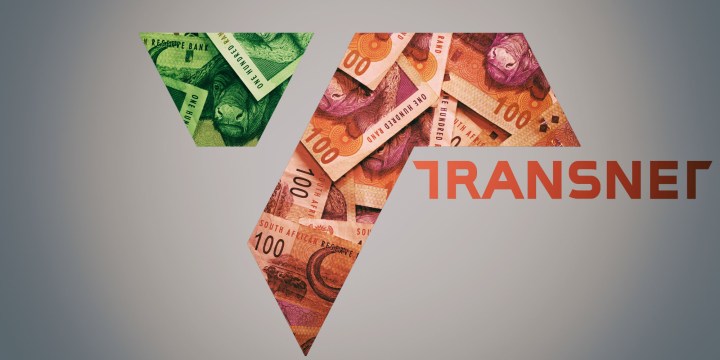LONG ROAD TO RECOVERY
Transnet far from being financially and operationally sustainable despite ‘accounting profit’

Although Transnet is still being stabilised after widescale looting through sullied contracts during the State Capture years, it doesn’t yet have cash or a strong financial profile. This is despite pencilling in a profit and unqualified audit.
On the surface, it may seem that the operational and financial situation of Transnet is turning for the better after the state-owned freight, rail and logistics company faced a sustained period of decline, especially during the State Capture years.
In late July, Transnet published its annual financial results on time — a rare event in SA’s state-owned enterprise (SOE) universe. SOEs such as SAA, SA Express, SA Post Office, Land Bank, Denel and Armscor are repeat offenders, often missing key deadlines to publish their financial results and present them in Parliament as is required by law. This has left the government and providers of funding or debt in the dark about the financial performance of SOEs that are crucial for SA’s economy and development.
But in Transnet’s case, not only were its latest financial results published within four months of its new financial year, which ends in March 2023, but the company also provided a timely operational update to members of Parliament on 3 August.
At a financial level, Transnet’s numbers look good, suggesting that it has recovered from years of mismanagement, corruption, and the loss of its competitive edge.
Transnet swung to an R8-billion profit for the year to end-March 2022 from a financial loss of R5-billion a year ago. And for the first time in four years, Transnet’s financial books received an unqualified audit, which means that the Auditor-General thinks they are an accurate reflection of the company’s financial position. But there is an interesting accounting backstory to these two developments.
Creative accounting
Although Transnet is still being stabilised after widescale looting through sullied contracts during the State Capture years, it doesn’t yet have cash or a strong financial profile. This is something that Portia Derby, Transnet’s CEO of the past two years, repeated several times in Parliament.
About Transnet’s financial numbers themselves:
First, Transnet was able to pencil in a profit because during its recent financial period it reassessed the value of its property portfolio, comprising offices, shopping/retail amenities, and warehouses that it owns and leases to generate a rental income. With the help of independent property valuers, Transnet reassesses the value of its portfolio of properties every three years.
The value of Transnet’s properties, like many others around the world, was negatively affected by the Covid pandemic, which led to reduced rental rates and, in some cases, a decline in property values. But after the hard Covid lockdown, the property market has stabilised and rental rates have recovered, generating more rental income for property owners such as Transnet.
The company recently revalued its property portfolio, the value of which shot up to R29.1-billion in the year ending March 2022 from R16.5-billion a year ago — an upward revaluation of more than R10-billion. This is known as a paper or book profit, which reflects an increase in the value of assets or investments but doesn’t involve actual cash reflected in financial books. In accounting standards, it is legitimately treated as a profit because Transnet would realise a higher value if it sold some of its properties.
Second, to receive an unqualified audit, Transnet got help from the National Treasury.
Transnet received permission from the Treasury to deviate from the requirements of the Public Finance Management Act (PFMA), which governs SOE operations, for three years until 2024 so that it doesn’t have to include irregular expenditure in its financial statements. But the irregular expenditure, the kind that is incurred without following PFMA requirements, has to be included or noted in Transnet’s annual report. Transnet’s recently published annual report put irregular expenditure at R104.3-billion in 2022, which was mostly incurred during the State Capture years when the company went on a spending spree to modernise its locomotives. Including fruitless and wasteful expenditure, this amount swells to R105-billion.
Derby has long argued that the inclusion of irregular expenditure — even amounts incurred historically — in its financial statements was unfair as it automatically led to an adverse audit opinion on its financial books by the Auditor-General. Transnet would receive a dressing-down from the Auditor-General for not addressing or remedying historical irregular expenditure in its financial statements. But the exclusion for the next three years will give Transnet the space to deal with sullied or irregular expenditure. It will also bring Transnet on an equal playing field with the private sector, which is not subjected to onerous PFMA requirements.
Were it not for these accounting adjustments (revaluing of its properties and Treasury exemption), Transnet would have reported a consecutive annual loss — this time of about R6.4-billion.
In the SOE universe, the big worry is about Eskom, its R396-billion debt burden, and funding requirements. But Transnet almost had a similar problem, which has gone largely unnoticed considering the noise around Eskom. A day before it published its results on 27 July, Transnet came close to defaulting on a 10-year foreign currency debt of $1-billion (about R16-billion), which was due to be paid on 26 July. A default on this debt would have pushed other lenders to call for immediate loan repayments, creating an Eskom-like crisis for Transnet. The company, which hasn’t received government bailouts or guarantees for over 20 years, would be forced to knock on the taxpayers’ door for help.
But Transnet, with borrowings of R129-billion, managed to avoid a default scenario at the eleventh hour, raising a loan of $1.5-billion, helping it to pay the loan that matured. Credit rating agencies S&P and Moody’s have been nervous about Transnet’s financial position, fearing that it might not have money to service debt that might soon mature. But Transnet has averted a liquidity crisis — for now.
Transnet operations heading in the wrong direction
Given Transnet’s crooked State Capture past, it is almost easy to forget how important its operations are for SA’s economy. Transnet is responsible for ferrying most of the iron ore and coal that is produced in South Africa and then taken around the world. It also has a major role in carrying freight and fuel around the country. When Transnet isn’t operating properly, many businesses and SA’s exports come to a standstill. But many years of financial mismanagement, poor maintenance of and underinvestment in its infrastructure, and a lack of competitive edge meant that Transnet has become a big threat to the economy.
Today, exporters, especially mining companies, cannot rail their goods to end users, losing a lot of money in the process. Miners like Kumba Iron Ore, Thungela, Exxaro, and Anglo American have previously blasted Transnet for the dysfunction of its rail system as they have reported at least R5-billion in lost export revenue among them in recent months.
Visit Daily Maverick’s home page for more news, analysis and investigations
This is happening at a time when global prices of commodities such as coal and iron ore have hit record highs, and mining companies should be increasing their export volumes, which, in turn, benefits Transnet financially. Even importers are feeling the pain, as they cannot land goods at Transnet ports, which further stunts SA’s economic growth potential.
Transnet has become so unreliable that road operators have stepped in and taken some of the company’s rail customers. Road operators are agile; today, it takes a few days to truck goods across the country while trains take weeks.
While Transnet’s ports and pipelines are improving, the big problem remains in Transnet Freight Rail, the company’s largest division, which accounts for 47% of its total group revenue of R68.5-billion. Volumes in the division continue to decline (see below).

There is so much to blame here: poor management of rail systems, infrastructure being hit by floods, riots, cable theft, and vandalism. Cable theft alone is costing Transnet a lot of money as a result of trains that are not running: it lost R140-million in revenue during 2017/18, which snowballed to R2.1-billion in 2021/22.
Further worsening volumes is the dispute between Transnet and South China Rail over a corrupt contract for 1,064 locomotives, which was declared illegal. And because of this, Transnet cannot procure spare parts for the locomotives that can transport coal and iron.
In fixing cable theft and vandalism, Transnet is partnering with the private sector, which is providing security resources and drone technology at its train lines. The partnerships are already having positive spinoffs, with reduced incidents of theft, Rudzani Ligege, the managing executive of Transnet Freight Rail, revealed in Parliament. On its coal rail lines alone since November 2021, Ligege says Transnet has seen a reduction in weekly theft incidents from 35 to 20.
“We have asked the private sector to help us. The issue of cable theft is not a Transnet issue but a national issue. We are in discussions with more of our customers, such as Sasol, to help us at other rail lines.”
Derby is looking to partner with the private sector to improve the company’s efficiency, including allowing companies from the sector to operate trains and bringing private terminal operators into the ports. The plan also includes buying more locomotives from August (it has about 350 locomotives that are not in use and standing idle), which might see Transnet ask for financial assistance from the government. This assistance might come in the form of government guarantees, which will allow Transnet to borrow money from local and international lenders.
An area in which Transnet is doing well is dismissing former executives and employees implicated in corruption and recovering stolen monies. Sandra Coetzee, Transnet’s chief legal officer, revealed in Parliament that all employees who were involved in the company’s controversial contracts for the acquisition of locomotives had either resigned or been dismissed.
Working with the Special Investigating Unit, Transnet plans to recover R26-million in the coming weeks from former employees who improperly benefited from contracts. But there is a long way to go as State Capture cost Transnet more than R41-billion. DM168
This story first appeared in our weekly Daily Maverick 168 newspaper, which is available countrywide for R25.




















 Become an Insider
Become an Insider
Poor service by Transnet to Richards Bay Coal Terminal (RBCT) is costing the country big time in lost revenue. Not only is the country losing out in tax revenue, but jobs at the terminal are under threat as targets are not being met. This is another example of poor management in SOE’s caused mainly by employing people who are not suitable for the positions they are in.